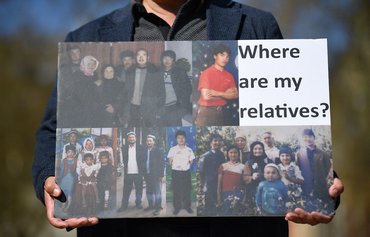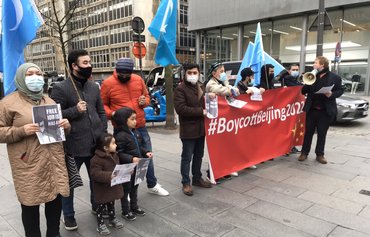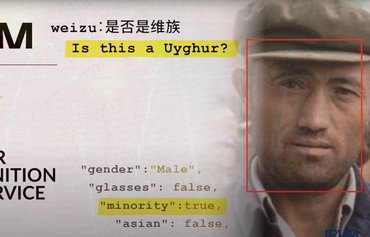BEIJING -- A new state-produced musical set in Xinjiang has hit China's cinemas, portraying a colourful rural idyll of ethnic cohesion --- one notably devoid of the reality of "re-education" camps, mass surveillance and horrific abuses that actually characterise the region.
More than one million Uighurs and other Turkic-speaking Muslims, including ethnic Kazakhs and Kyrgyz, are incarcerated in camps in Xinjiang where "genocide" is being inflicted.
After initially denying the camps existed, Beijing now defends them as "vocational training centres" aimed at stamping out terrorism and improving employment opportunities.
But clear evidence of slavery and forced labour inside Xinjiang's cotton industry continue to draw global protest, and investigations into the systematic rape, sterilisation and abuse of Uighur women have aroused international outrage.

The Chinese government has unleashed a fresh wave of propaganda to counter criticism of the regime's treatment of Uighur Muslims in the Xinjiang region. The latest push includes a colourful musical film called 'The Wings of Songs', shown in a screenshot from YouTube.
![The reality: a watchtower on a high-security facility near one of the many 're-education camps' in Xinjiang. [Greg Baker/AFP]](/cnmi_am/images/2021/04/09/29336-uighur-2-600_384.jpg)
The reality: a watchtower on a high-security facility near one of the many 're-education camps' in Xinjiang. [Greg Baker/AFP]
The country's treatment of ethnic minorities in Xinjiang is a "shining example" of its human rights progress, said Chinese Foreign Minister Wang Yi in February.
Inspired by Hollywood
As the furore increases, China has launched an elaborate public relations offensive at home and abroad in an attempt to change the narrative.
Rap songs, photo exhibitions and now a new musical -- "The Wings of Songs" -- are leading the cultural reframing of the region, while a legion of celebrities have seemingly unprompted leapt to the defence of Xinjiang's tarnished textile industry.
Beijing denies all allegations of abuses and has instead recast Xinjiang as a haven of social cohesion and economic renewal that has turned its back on years of violent extremism thanks to benevolent state intervention.
The movie, the release of which was reportedly delayed by a year, focuses on three men from different ethnic groups dreaming of the big time as they gather musical inspiration across cultures in the snow-capped mountains and desertscapes of the vast region.
Trailing the movie, state-run Global Times reported that overseas blockbusters such as Hollywood's "La La Land" have "inspired Chinese studios" to produce their own domestic hits.
But the musical omits the surveillance cameras and security checks that blanket Xinjiang.
Also noticeably absent are references to Islam -- despite more than half of the population of Xinjiang being Muslim -- as well as mosques or women in veils.
In one scene, a leading character, a well-shaven Uighur, toasts with a beer in his hand.
Harsh reality check
Inside China, discussion of the Uighur issue is stifled.
In February, China swiftly closed down the Clubhouse app, an audio platform where uncensored discussions briefly flowered including on Xinjiang, with Uighurs giving unvarnished accounts of life to attentive Han Chinese guests.
That brief opening of the "real" internet in China offered a rare space to dissect taboos across politics and society, a plurality of voices normally muted by the Chinese Communist Party.
Alex Su, 30, an editor at a technology start-up in Beijing, said that in her brief time on Clubhouse, she had been especially moved by a conversation in which Muslim Uighurs recounted personal stories of suffering discrimination in Xinjiang.
"That is really the kind of information that we don't usually get access to in the mainland," she told The New York Times in a telephone interview.
Beijing "knows that a lie repeated a thousand times becomes truth", Larry Ong, of US-based consultancy SinoInsider, told AFP.
For others, the latest propaganda push on Xinjiang appears to be working.
"I have been to Xinjiang, and the film is very realistic," one moviegoer told AFP after seeing "The Wings of Songs" in Beijing.
"People are happy, free and open," he said, declining to give his name.
Uighur rights activists quickly denounced the movie's presumptions.
"The notion that Uighurs can sing and dance so therefore there is no genocide -- that's just not going to work," Nury Turkel, a Uighur-American lawyer and senior fellow at the Hudson Institute in Washington, told The New York Times.
"Genocide can take place in any beautiful place."
China's 'wolf warriors' bite back
Chinese "wolf warrior" diplomats have become increasingly aggressive in their rhetoric and response to international and domestic issues, including on Xinjiang, firing insults over Twitter -- a network banned in China -- smearing critics and suggesting conspiracies.
The term "wolf warrior diplomacy" became common parlance in 2019, when Chinese envoys -- most prominently Chinese Foreign Ministry spokesman Zhao Lijian -- adopted a vociferous defence of the country on social media platforms.
The nickname derives from a film about a Rambo-like Chinese special forces soldier.
The recent hyperactivity of the envoys follows the renewed global pressure over Beijing's treatment of Muslims in Xinjiang.
In late March, as the European Union, Britain, Canada and the United States imposed sanctions over Xinjiang, Chinese Foreign Ministry spokeswoman Hua Chunying went as far as to suggest that the US Central Intelligence Agency helped cook up rhetoric on Xinjiang to destabilise China.
Turkey on Tuesday (April 6) summoned China's ambassador after his office took to social media to denounce two top Turkish politicians over their criticism of Beijing's crackdown on Muslims.
The same day, a Chinese court handed down death sentences to two Uighur former government officials in Xinjiang for carrying out "separatist activities".
The pushback has also taken on a pop culture edge, with a rap released in March castigating "lies" by the "Western settlers" about cotton from the region, while state broadcaster CGTN is set to release a documentary on the unrest that prompted the Beijing crackdown.

![A screenshot of 'The Wings of Songs' musical from YouTube. [File]](/cnmi_am/images/2021/04/09/29335-wings-600_384.jpg)






